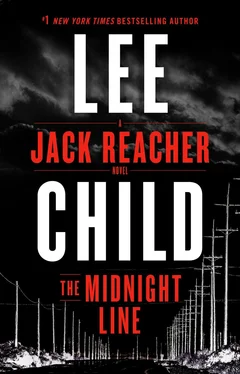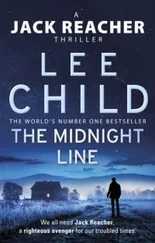“Ask your neighbors back home.”
“They go to rehab. We need a pusher.”
“We’re sitting ducks here,” Reacher said. “Some kind of trouble is coming.”
—
Mackenzie spent another hour with her sister, and then she came out and said she was ready to go check out of the hotel. Back in four hours, she had promised. With her bags. Ready to stay as long as it took. Bramall shrugged, and finally agreed to do the same. Outside his comfort zone, but hey, second career. Reacher said he was already checked out. He never paid for more than a night at a time. His toothbrush was in his pocket. He had no other luggage. All in all he would prefer to stay in the peace and quiet, and see them later. Mackenzie went back in to tell her sister the updated arrangement, and then she and Bramall drove away.
Reacher sat on the porch step. Already his accustomed spot. Ahead of him the ravine widened and fell away. Beyond it the horizon was dusty orange, with ghostly blue mountains behind it. The air was clear and silent. He watched birds of prey riding thermals, and condensation trails eight miles up, and a chipmunk on a rock ten feet away.
Then behind him the front door opened.
The chipmunk disappeared.
The shared voice said, “Major Reacher?”
He stood up and turned around. She was in the doorway, in her silver track suit top. The hood was pulled forward. She was peering out from deep inside. Shadowy scars, and aluminum foil. Steady eyes.
She said, “I would like to continue yesterday’s conversation.”
“Which part?”
“When I thought you were here on business.”
“I’m not.”
“I accept that. All I want is your opinion. You might know things I don’t.”
“Come sit down here,” he said. “It’s a beautiful day.”
She paused a beat, and then stepped out and crossed the porch. She was lithe and petite and moved like an athlete. Which she was. The infantry was an athletic discipline. She sat on the same step as Reacher, maybe a yard apart. She smelled of soap, and something astringent. The stuff on her face, he figured. Under the foil. Sideways on all he could see was the hood, pulled forward like a tunnel.
The chipmunk came out again.
She said, “I told you I had a friend whose case is still open.”
“Sy Porterfield,” he said.
“You are here on business.”
“No, but I picked things up along the way.”
“How much do you know about him?”
“Very little,” Reacher said. “Except he was your friend for a spell, and a rich Ivy Leaguer, and a Marine, and wounded, and he liked authenticity so much he would rather catch drips in a bucket than replace his leaky roof.”
“That’s a fair summary.”
“Also he had three sealed files in the Pentagon.”
“I can’t talk about those.”
“Then how can I give an opinion?”
“In theory,” she said. “Why would an investigation just die away?”
“All kinds of reasons. Maybe it wasn’t what they hoped it was. Maybe it dead-ended. Maybe it was too hard all along. I would need to know more.”
“I can’t tell you.”
“Then let me make an educated guess. Maybe it fell between two stools. The Pentagon seems to have the original file. Let’s say two years ago Porterfield had something on his mind. Why would he call the Pentagon? That was not a natural reflex. Twelve years before he had been a combat lieutenant in the Marines. The Pentagon was never a part of his life. I bet he never even saw the place. I bet he didn’t have the phone number. But he found it out and dropped a dime. Which means the thing on his mind must have had some kind of high-level military aspect. Then the Pentagon copied in the DEA, which means it must also have had some kind of high-level narcotics aspect. Maybe there was miscommunication. Maybe the Pentagon thought the DEA was dealing with it, and the DEA thought the Pentagon was dealing with it. So in the end no one dealt with it.”
“I can’t talk about the details.”
“We know his house was broken into after he died.”
“Yes, I saw that. I went back a few times, just to walk around.”
“Looked like an old-fashioned black-bag job to me.”
“I agree it was neat.”
“You know who it was.”
“I can’t talk about it.”
“You know what was taken.”
“Yes.”
“Will you answer one question?”
“Depends what it is.”
“Just a yes or no answer. That’s all I need. No details, no background. Nothing more than you want to say.”
“Promise?”
“Just a yes or no. To put my mind at rest about something.”
“About what?”
“Do you know how Porterfield died?”
“Yes,” she said. “I was there.”
—
Special Agent Kirk Noble’s division was based in Denver, Colorado. His office was a bland beige space temporarily brightened up by the gold from the shoebox he had taken from Billy’s house in Wyoming. It was all laid out on his desk, all in an orderly fashion. All the gold trinkets. The crosses on the chains, the earrings, the bracelets, the charms, the chokers, the fashion rings, the wedding rings, the class rings. He had to fill out an inventory form. Description and value.
Some of it was junk. Some of it was pressed out of thin alloys no jeweler would have recognized. Twenty cents, literally, for some of the items. Others were merely mediocre. Seven bucks by weight for this, nine if you were lucky for that. Other items were better. There was an eighteen-carat wedding band, thick and heavy. A handsome piece. Fifty bucks in a pawn shop, easy. Same for a pair of earrings. Eighteen carat, solid and heavy. Two of them. Maybe sixty bucks together.
When he was finished he looked at his list. The right-hand column. The values. They made no sense. They were completely random. From practically zero all the way to a decent wad of cash. Stopping, crucially, at every price point along the way. Two bucks, three bucks, four bucks, all the way to more than sixty. Which was not how the business worked. It was not like a boutique delicatessen, where you bought a pinch of this and a twist of that. You bought a ten-dollar bag of brown powder for ten dollars. Or you didn’t. Or you bought two for twenty dollars. Or three for thirty. What an economist would have called stair-step pricing.
Whereas Billy’s pricing was notably granular. As if he was selling five-dollar bags, and six-dollar bags, and thirteen-dollar bags, and seventeen-dollar, and nine-dollar. Full service. Whatever the customer wanted. Filled there and then, and weighed on a scale.
Highly unlikely.
Therefore perhaps he wasn’t selling bags of powder at all. Perhaps his product came in bulk. Perhaps for retail purposes the large quantities could be broken down, all the way to individual items if necessary, for folks with limited resources. Or cut with scissors into halves and quarters, for the truly broke.
Just like the old days.
Impossible.
He picked up his desk phone and called down to the jail.
He said, “I’m expecting a transfer from Oklahoma. Name of Billy something.”
The voice on the phone said, “We just processed him in.”
“Take him straight to an interview room. Tell him I have questions. I’ll come down in a couple hours. Let him sweat till then.”
—
Nothing more than you want to say, Reacher had promised, and it turned out Rose Sanderson wanted to say nothing more. Not on the subject of Porterfield, at least. She just nodded to herself, inside her hood, as if the matter was settled.
Then she said, “My sister told me you asked how it felt to be pretty.”
“Yes,” he said.
“You knew about me by then.”
“It made sense.”
“I’m sure she gave a conflicted answer. She’s still pretty. Deep down pretty people know other people feel they’re getting something for nothing. They have to be aw-shucks about it. They have to say it makes them feel shallow. But now I can tell you. It makes them feel great. It’s like bringing a gun to a knife fight. Sometimes I would dial it up and just mow them down, one by one, bam, bam, bam. It’s a superpower. Like clicking the phasers from stun to kill. There’s no point denying it. It’s a significant evolutionary advantage. Like being as big as you are.”
Читать дальше












